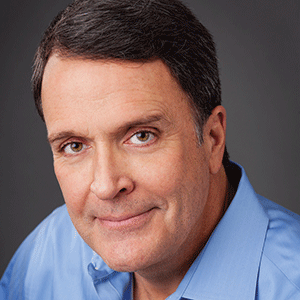Leadership expert Mark Sanborn challenges you to disrupt yourself

Mark Sanborn probably doesn’t have anything to teach meeting professionals—or most other people, for that matter—about their industry. But the award-winning speaker, author and leadership expert has plenty of insights to help all of them.
“I can’t teach John, our chief cardiac surgeon, about medicine or surgery,” he writes in his new book, The Potential Principle. “But I can teach the process that he or anyone else can use to improve. I can challenge his thinking and understanding, and provide new insights he can then apply to his highly specialized area.”
Sanborn says most people underestimate their own (and others’) potential, and asserts they can achieve it by disrupting themselves, focusing, engaging others and expanding their capacities.
Disrupt Yourself
Disruption traditionally has had a negative connotation that suggests an undesirable interference. But, due to its use in the tech world, it is now commonly being used to refer to intrusion that upsets the status quo in a positive way.
“Self-disrupters unsettle the complacent, challenge mediocrity, drive innovation, and keep people and companies growing,” Sanborn writes. He contends that disrupting yourself opens the path to growth, pre-empts competition, develops mental muscle and creates unforeseen opportunities. Sanborn encourages us to switch things up to keep our journey interesting, to ask more disruptive questions, and to learn from our mistakes and failures. Throwing off old ideas can make room for new, better ways of doing things.
Yes, self-disruption can be risky; it involves abandoning certainty, and there’s no guarantee that it will work. But lulling ourselves into routines closes us off to opportunities.
Refocus
“On the path toward achieving long-term success professionally, you’ll encounter obstacles and detours,” Sanborn writes. “You can’t control all of them, but you can control your focus.”
Refocusing saves time and energy, keeps you—or puts you back—on track, brings others into alignment and speeds up results. Refocusing requires challenging your current focus, refraining from multitasking, devoting uninterrupted time to work on important improvements and making refocusing an ongoing process.
Sanborn suggests setting a goal of writing down the deepest insight we gain each week, and then translating it into large and small actions every day. For example, Sanborn read that the most successful participants in a study on how to lose belly fat ate the same things they normally ate, but reduced the portion size. He then made portion control a part of his own daily focus.
Engage Others
Engaging others and building mutually beneficial relationships is the secret to leveraging everything we do, Sanborn says.
“Many of the people around us possess wisdom, but we don’t benefit completely from it by simply observing,” he writes. “We have to engage people deeply in order to access the wisdom they have to offer.”
He recommends engaging others through a study group or professional association; by engaging an adviser, coach or mentor; or by meeting periodically with a few people with interesting ideas to discuss a topic.
Specific actions: Start with who knows best; solicit advice, ideas and counsel; engage more deeply and widely; form a master-mind group; and always offer to compensate in some way for “free” advice.
Increasing Capacity
Throughout his book, Sanborn encourages readers to stretch their boundaries and handle more than they think is possible—without trying to tackle the whole world.
“You can get better at anything, but you can’t get better at everything, at least not significantly,” he writes. “Why? There just isn’t enough time. To become world-class at anything is extremely demanding.”
He advocates increasing capacity because it provides more tools for your life kit, fulfills more of your potential, supports and leverages other development and bolsters your confidence. Capacity can be increased by inventorying what you already have, adding complementary skills, tracking progress and regress, practicing as much as you can, expanding your experiences and layering your confidence (since success breeds confidence, and confidence breeds success).
5 Steps to Achieve Your Potential
In The Potential Principle, Mark Sanborn emphasizes the importance of taking the following five steps to achieve your potential.
- Clarify what matters most to you.
- Make the important things matter to others with meaning and commitment.
- Teach, encourage and recognize improvement in others.
- Make your performances matter.
- Make a mind-set better.
Mark Sanborn is president of Sanborn & Associates, Inc., an idea lab for leadership development. Listed by Globalgurus as one of the top 30 leadership experts in the world, he is a speaker and the author of eight books, including The Fred Factor, an international bestseller.





